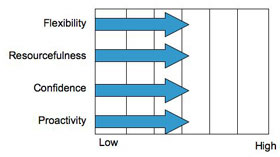Silicon Valley.com‘s sharp-witted columnist, John Murrell deserves the credit for seizing on the “two-faced” word play in his characterization this week of Facebook’s dilemma concerning whether to allow (or not) groups that deny the Holocaust to post and set up communities on their social networking site. As he and others like Lisa Respers writing in CNN.com suggest, there’s no win here for Facebook. Remove the Holocaust Deniers from the site, and you’re imposing your morals on open, free expression (what do you suppress next?); allow them to post, and you appear to be condoning or endorsing despicable hate initiatives, contributing to new recruits being drawn to the movement, possibly inciting hate-related crimes, and certainly offending people. The harder you look at the issue, the murkier it gets, with layers of repercussions emerging for taking either of the positions: remove them, and you’re on a slippery slope, opening yourself to demands to treat other ‘questionable’ postings; don’t remove them, and risk uncomplimentary comparisons to cases where you did censor, as in recently deleted photos posted by breast-feeding mothers, or ‘lactivists’. Continue reading “Two-Facedbook’s Holocaust Denial Dilemma”
Tag: flexibility
What Makes Great Problem-Solvers Different?
Ever wonder what it would take to be a better problem solver than you are? It’s not a bad question, and if you can raise your level bit by bit over time, what a payoff!
In the book No Problem, I come at this from a number of angles. In this first post, I’ll describe the four crucial ways great problem solvers differ. In the next one I’ll introduce the three-level Problem Solving Hierarchy that distinguishes between the major kinds of issues we typically face. After that, I’ll start applying the ideas to situations we all face in the real world.
Sure, it’s a pretty wide open topic, but the best problem solvers (and this could mean you) exhibit these tendencies and skills:
* Flexibility They take situations as they come, not all in the same way. They don’t prejudge and they don’t have an answer ready before a challenge is known. Beware the person who claims to have a method that works for everything. Flexibility needs to be earned through practice and experience, not acquired or even learned in the conventional way.
 * Resourcefulness They have lots of methods, examples, friends, and experiences to draw on. The richer you’re kit bag, the more proficiencies you have, the better the results are likely to be.
* Resourcefulness They have lots of methods, examples, friends, and experiences to draw on. The richer you’re kit bag, the more proficiencies you have, the better the results are likely to be.
* Confidence They carry a positive, resilient, optimistic attitude. Shimon Perez, Israel’s elder statesman has described his outlook as choosing to be an optimist, saying “We all die the same way, but we have the choice to live as otimists or pessimists”. So do we all.
* Proactivity They are ready to act on what needs doing, and have the courage and initiative to make a difference when it matters.
Check it out: we are all somewhere between high and low on the four core attributes, and we are all capable of improving if we want to do so. This is not magic; you earn it through your actions and the choices you make.
